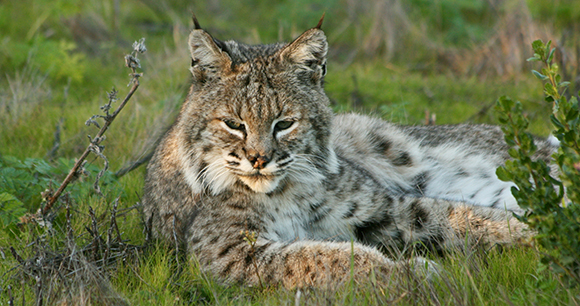
Washington, DC—Today, more than 14 members of the US House of Representatives introduced legislation that would prohibit organizing, sponsoring, conducting, or participating in wildlife killing contests on more than 500 million acres of US public lands.
Wildlife killing contests are organized events during which participants compete for cash or prizes by killing the most, the largest, or the smallest animals over a certain period of time. Each year, thousands of native carnivores and other wildlife—including coyotes, foxes, bobcats, raccoons, rabbits, prairie dogs, mountain lions, and wolves—are killed during these cruel, senseless competitions.
The Prohibit Wildlife Killing Contests Act of 2024, introduced by Rep. Steve Cohen (D-Tenn.) and other congressional leaders, would require the Bureau of Land Management, Bureau of Reclamation, National Park Service, US Fish and Wildlife Service, and US Forest Service to enact regulations banning wildlife killing contests within one year of the law being passed.
“America’s wildlife play a special role in the natural environment and in a healthy ecosystem,” Cohen said. “Killing apex predators and other targets for what some deem ‘sport’ is both cruel and unnecessary. These contests serve no legitimate wildlife- management purpose and ending them is the right thing to do.”
“Wildlife killing contests are cruel events that have no place in modern civil society,” said Johanna Hamburger, director and senior attorney for the Animal Welfare Institute’s Terrestrial Wildlife Program. “Participants frequently violate the fundamental hunting principle of fair chase by using bait and electronic calling devices to maximize the likelihood of winning, and animal carcasses are usually dumped once the contest is over.”
“It’s shocking that these cruel and reckless contests are still allowed on our public lands,” said Stephanie Kurose, deputy director of government affairs at the Center for Biological Diversity. “America’s wild carnivores are so important to maintaining healthy ecosystems. They deserve better than to be targeted in these thrill-kill slaughter fests.”
Ten states—Arizona, California, Colorado, Maryland, Massachusetts, New Mexico, New York, Oregon, Vermont and Washington—have already outlawed wildlife killing contests within their borders.
“Most people are shocked to learn that wildlife killing contests are even legal on our public lands,” said Camilla Fox, founder and executive director of Project Coyote. “Killing animals for prizes and entertainment is ethically indefensible, ecologically reckless, and anathema to sound wildlife conservation and management.”
“In addition to being unethical and unsportsmanlike, wildlife killing contests run counter to science-based wildlife management policy,” said Jennifer Eskra, director of legislative affairs of the Humane Society Legislative Fund. “This bill would end this execrable practice and protect wildlife at a national level, something that 10 states have already done.”
“Wildlife killing contests have absolutely no place in our country, including on our public lands,” said Katie Stennes, senior program manager for wildlife protection at the Humane Society of the United States, which has conducted undercover investigations into these competitions in more than a dozen states. “These ‘cash for wildlife’ competitions, where native species are targeted, killed, and then piled up for photos and bragging rights, are unacceptable. These animals should be respected for their intrinsic value and their key role in healthy ecosystems. We urge Congress to end senseless, wasteful wildlife killing competitions once and for all.”
Additional cosponsors of today’s legislation are Reps. Earl Blumenauer (D-OR), Cori Bush (D-MO), Gerald Connolly (D-VA), Diana DeGette (D-CO), Lloyd Doggett (D-TX), Adriano Espaillat (D-NY), Raul Grijalva (D-AZ), Jared Huffman (D-CA), Ted Lieu (D-CA), Betty McCollum (D-MN), Grace Meng (D-NY), Jerrold Nadler (D-NY), Katie Porter (D-CA), Melanie Stansbury (D-NM), Rashida Tlaib (D-MI), and Dina Titus (D-NV).
Marjorie Fishman, Animal Welfare Institute
[email protected], (202) 446-2128
Stephanie Kurose, Center for Biological Diversity
[email protected], (202) 849-8395
Camilla Fox, Project Coyote
[email protected], (415) 945-3232
Megan Mersino, Humane Society of the United States and Humane Society Legislative Fund
[email protected]
The Animal Welfare Institute (awionline.org) is a nonprofit charitable organization founded in 1951 and dedicated to reducing animal suffering caused by people. AWI engages policymakers, scientists, industry, and the public to achieve better treatment of animals everywhere—in the laboratory, on the farm, in commerce, at home, and in the wild. Follow us on Facebook, X (formerly Twitter), and Instagram for updates and other important animal protection news.
The Center for Biological Diversity is a national, nonprofit conservation organization with more than 1.7 million members and online activists dedicated to the protection of endangered species and wild places.
Project Coyote, a national non-profit organization, is a North American coalition of scientists, educators, and citizen leaders promoting compassionate conservation with North America’s wild carnivores through education, science, advocacy, and coalition building. Visit ProjectCoyote.org for more information.
The Humane Society of the United States fights the big fights to end suffering for all animals. Together with millions of supporters, the HSUS takes on puppy mills, factory farms, the fur trade, trophy hunting, animal cosmetics testing and other cruel industries. Through our rescue, response and sanctuary work, as well as other direct services, we help thousands of animals in need every year. We fight all forms of animal cruelty to achieve the vision behind our name: a humane society.
Humane Society Legislative Fund works to pass animal protection laws at the state and federal level, to educate the public about animal protection issues and support humane candidates for office. Formed in 2004, HSLF is incorporated under section 501(c)(4) of the Internal Revenue Code as a separate lobbying affiliate of the Humane Society of the United States.